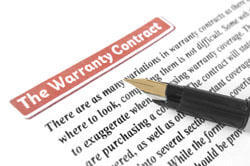This content is provided courtesy of USAA.
It's Murphy's Law: Your 3-year-old truck starts sputtering just a few months after the manufacturer's warranty expires, putting you on the hook for a $1,500 repair job.Experiences like this — or fear of them — lead many car buyers to purchase extended vehicle warranties, transferring the cost of a breakdown to someone else's wallet.
But are extended warranties lifesavers or money wasters? The truth is, not all extended warranties are created equal. Ultimately, the value you get from such a contract will depend on who you buy it from, when you buy it, and how well you understand the terms of coverage. Here are a few tips to help guide your decision.
Think ahead.You can't predict the future, but you can make reasonable assumptions about the vehicle you're buying, your finances and your tendency to trade up.
First factor in the reliability ratings of your car — how likely is it to break down? Also, consider how much a major repair bill would rock your household budget. If that's a scary thought, paying upfront for a service contract could be a wise choice. One important thing to keep in mind: Some repairs may not be covered by the contract.
You should also think about how long you plan to keep the car. Most manufacturer warranties on new cars cover three years or 30,000 miles, whichever comes first. If you're likely to want another new vehicle after a few years, buying an extended warranty might not make sense. But if you're the type who is content to keep your car for awhile, you might want to prepare for more repairs as your vehicle ages.
Don't be pressured.Some auto dealerships encourage customers to buy extended warranties regardless of whether they need them. But you're under no obligation to buy right then and there. In fact, you're better off shopping around to compare third-party (called "aftermarket") service contracts to the dealer's offer. Making a separate transaction, when you're not also negotiating the price of the car and financing terms, can help you arrive at a cool-headed decision.
"Car dealers often resell the extended warranty to you at two to three times what they paid," writes Jeff Ostroff on his consumer advocacy website, CarBuyingTips.com. "Sure, it's convenient to just buy an auto warranty while sitting at your (auto dealer), but it's also convenient to go online and buy a better extended warranty for half the price."
As you're weighing your options, don't fall prey to scare tactics from junk mailers or unsolicited phone calls claiming, "You must act now to extend your coverage!"
Take your time, but be aware that prices for service contracts tend to go up shortly before the manufacturer's warranty expires.
Know who you're dealing with.While bargain shopping is a good idea, take care to weigh the price against the quality of the company that backs the service contract. "If you read and completely understand the coverage a warranty provides, a contract with a major auto manufacturer or respected financial services company is a safe bet," says Steve Thompson, assistant vice president in charge of USAA's Car Buying Service. "Approach other aftermarket warranty companies with caution. It is a good idea to check with the Better Business Bureau and online review sites to understand the quality of the product you are purchasing and how customers are treated when a claim arises."
Compare apples to apples.Service contracts come in all shapes and sizes. Lower-end warranties might cover only major mechanical breakdowns; mid-priced contracts may also cover normal wear and tear; and the most expensive contracts are "bumper to bumper," covering all but a few types of repairs.
Also be sure to compare the deductible and the method of payment on the plans you're considering. Some require you to pay the mechanic out-of-pocket and file for partial reimbursement. Other plans pay for repairs directly, but require a co-pay from you. And some contracts have no deductible at all.
However convincing the salesperson's pitch may be, there's no such thing as a one-size-fits-all service contract. As with any financial decision, thinking carefully about your personal needs is the safest route to a purchase that will pay off.










